West Coast Ports Warns of Long-Term Impacts from U.S.-China Trade War

FILE PHOTO: Shipping containers are pictured at Yusen Terminals (YTI) on Terminal Island at the Port of Los Angeles in Los Angeles, California, U.S., January 30, 2019. REUTERS/Mike Blake/File Photo
West Coast ports are calling on President Donald Trump to settle the U.S.-China Trade War, warning that failure to do so will cause irredeemable economic harm to employers, workers and U.S. residents.
The concerns were raised to President Trump in a letter from six of the busiest ports on the West Coast, including the ports of Los Angeles, Long Beach, Oakland, Portland, Tacoma and Seattle, along with the The Northwest Seaport Alliance.
“As the largest ports on the U.S. West Coast, we are writing to share our concerns that the long-term impacts of the escalating trade conflict between China and the United States will create irredeemable economic harm to employers, workers, residents and international partnerships along the entire coast and throughout the country,” the ports stated in the letter.
The letter comes as West Coast ports continue to impacts from the on-going trade war and threats of additional tariffs from both sides. Exports were highlighted as being particularly hard-hit.
“The impacts of the back-and-forth tariffs between the United States and China have hit our exporters particularly hard, and we are hearing deep concern from our customers about their increasing challenges due to rising U.S. tariffs and Chinese retaliation,” the letter states.
“California is the largest exporter to China of any state in the nation; in 2018, California ports collectively saw a decrease of about 30 percent in exports to China. The impact is even more stark when viewed by specific commodities. Exports to China of wheat – grown across 10 states from the Pacific Northwest to the Midwest and exported via Washington and Oregon ports on the Columbia River – have nearly ceased this year. In California, export declines to China are seen in soybeans (-96.9 percent), grains (-85.5 percent), glass (-86.5 percent) and rubber (-74.9 percent),” the letter adds.
Over the past several years, the ports have been outspoken on a number of tariff-related issues.
“Our core message in each of these communications has been the same: we support a balanced trading relationship with our global partners but are deeply concerned that the continued imposition of ever-increasing tariffs leads to higher costs on U.S. businesses and consumers and loss of valuable markets without any long-term strategic benefit,” the letter warns.
“There are justifiable concerns about how China’s current trade practices are interfering with the success of U.S. exporters, and we appreciate that you are working toward long-term structural reforms in the U.S.-China trade relationship,” the letter adds. “However, our farmers, ranchers, fishing industry, manufacturers and retailers are already deeply harmed by the tariffs and retaliation to-date, and spreading and increasing the impact will make that problem worse. Instead, we urge you to pursue fair, mutually beneficial trade agreements that open new market access opportunities, create a level playing field for America businesses, and protect our workers and the environment.”
HEADLINES
- Do shipping markets want Biden or Trump for the win?
- All 18 crew safe after fire on Japanese-owned tanker off Singapore
- Singapore launching $44m co-investment initiative for maritime tech start-ups
- Cosco debuts Global Shipping Industry Chain Cooperation Initiative
- US warns of more shipping sanctions
- China continues seaport consolidation as Dalian offer goes unconditional